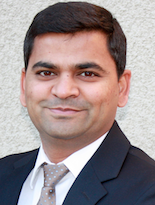 Big strides forward in technology and global business practices have sparked a new industrial revolution where machine intelligence and machine-to-machine communications will ultimately dominate, according to Nikhil Chauhan, Director for Product Marketing, GE Global Research.
Big strides forward in technology and global business practices have sparked a new industrial revolution where machine intelligence and machine-to-machine communications will ultimately dominate, according to Nikhil Chauhan, Director for Product Marketing, GE Global Research.
On the surface, the modern industrial world looks similar to the industrial world of the recent past. A quick glimpse shows the same aeroplanes, factories, hospitals, utilities, assets, networks, people and processes as before. But peel back its skin and the modern industrial world reveals a paradigmatically different place. There was a time when machines, networks, businesses and people operated as independent silos communicating with each other only peripherally, but the modern industrial enterprise is becoming a deeply interconnected ecosystem of smart machines, Big Data and people, collectively known as the Industrial Internet. This new Industrial Internet revolution features machines that are self-aware, that can connect and interact with other machines and their human operators, that can be provisioned, managed, upgraded, and decommissioned remotely, that function safely and securely, and that can dramatically improve industrial operations at all levels of the global economy.
Machine-to-machine (M2M) communication, a key component of this revolution, has a rich history in the industrial world, and many existing technologies and standards provide a high degree of functionality across M2M communication. Yet these standards are insufficient to deliver the enormous gains in efficiency that are now possible in industry thanks to advances in communications, analytics, computational power, sensors, virtualisation and cloud technologies. Industrial companies need to move their operations into the 21st century to extend M2M interaction to a new level of functionality, efficiency, and potential savings of $320 billion to $640 billion annually.
In the short-term, modern industrial businesses need a data analytics and operations-driven approach that allows them to collect and deliver the right data, from the right end points, in the right velocity and quantity to a wide set of well designed analytics that provide new insights and support more efficient operations at all levels. In the longer-term, industrial companies need a real-time wide area control environment that allows them to safely and securely deploy, manage, upgrade and decommission an increasingly intelligent set of assets in a controlled, deterministic manner, whether the asset is a single device or an entire fleet or plant full of assets.
Impeding these short-term and long-term objectives is the fact that the software and hardware in today's industrial machines are very interdependent and closely coupled, making it hard to upgrade software without upgrading hardware, and vice versa. Also lacking are standards and best practices that support agile development and deployment, as well as the reusability, scalability, interoperability and portability required to leverage the Industrial Internet. What's needed is the technology and best practices that support a data and analytics driven environment based on machine-centric distributed computing models designed specifically for industrial settings.
GE has developed the Predix software platform to open up the reality of the Industrial Internet to a wide range of industrial companies and stakeholders, from manufacturers and their suppliers to machine operators, buyers, and most importantly, the global society in which we all work and live. Predix provides a standard way to run industrial scale analytics and connect machines, data and people. Deployed on machines, on-premise or in the cloud, Predix combines a stack of technologies for distributed computing and big data analytics, asset management, machine-to-machine communication and mobility.
Also at play are new standards and best practices for connectivity and interoperability that allow new and old devices to interface and interoperate, permitting older proprietary systems to co-exist alongside more modern machines and technology. As a result, industrial companies can take advantage of advancements in processor technology, including multi-core implementations and hardware hypervisor support, as well as new capabilities in networking, storage and cloud-based computing to create what GE calls 'brilliant machines'.
Brilliant machines run advanced machine apps, software and operating systems and can function autonomously or connect to other machines in a synchronised fashion. Over 50 billion such intelligent devices will be connected by 2020 according to published reports. Their ecosystem scales from the individual sensor, wind turbine, jet engine or medical device to an entire industrial plant, hospital, fleet of planes or power grid. And at every level of operations, the modern industrial company can deploy advanced analytics that support operations and business processes at all levels of the company, in a context-based manner.
These capabilities also set up the wide area control, in real-time, of industrial assets from a 'single pane of glass' that will allow groups of devices or assets to be deployed, managed, upgraded and decommissioned in a more centralised and efficient manner, allowing industrial companies to deliver new business models and levels of service that simply have not been attainable to date. Software changes can be pushed out simultaneously to an entire network of devices, much like what is done with smartphone apps today, instead of laboriously upgrading each machine's software (and often its hardware) on a machine-by-machine basis.
With Predix, GE is creating an ecosystem of partners and value added companies that will help make the Industrial Internet a reality. These partners - taken from the ranks of industry, technology companies, academia, non-profits, systems integrators and the financial world - are engaging with GE in establishing standards and driving the knowledge and products needed to make Predix an industry standard in its own right. And GE is already seeing valuable contributions from collaborations with industrial, enterprise and developer communities. The next Industrial Revolution has already begun.?Big strides forward in technology and global business practices have sparked a new industrial revolution where machine intelligence and machine-to-machine communications will ultimately dominate, according to Nikhil Chauhan, Director for Product Marketing, GE Global Research.
On the surface, the modern industrial world looks similar to the industrial world of the recent past. A quick glimpse shows the same aeroplanes, factories, hospitals, utilities, assets, networks, people and processes as before. But peel back its skin and the modern industrial world reveals a paradigmatically different place. There was a time when machines, networks, businesses and people operated as independent silos communicating with each other only peripherally, but the modern industrial enterprise is becoming a deeply interconnected ecosystem of smart machines, Big Data and people, collectively known as the Industrial Internet. This new Industrial Internet revolution features machines that are self-aware, that can connect and interact with other machines and their human operators, that can be provisioned, managed, upgraded, and decommissioned remotely, that function safely and securely, and that can dramatically improve industrial operations at all levels of the global economy.
Machine-to-machine (M2M) communication, a key component of this revolution, has a rich history in the industrial world, and many existing technologies and standards provide a high degree of functionality across M2M communication. Yet these standards are insufficient to deliver the enormous gains in efficiency that are now possible in industry thanks to advances in communications, analytics, computational power, sensors, virtualisation and cloud technologies. Industrial companies need to move their operations into the 21st century to extend M2M interaction to a new level of functionality, efficiency, and potential savings of $320 billion to $640 billion annually.
In the short-term, modern industrial businesses need a data analytics and operations-driven approach that allows them to collect and deliver the right data, from the right end points, in the right velocity and quantity to a wide set of well designed analytics that provide new insights and support more efficient operations at all levels. In the longer-term, industrial companies need a real-time wide area control environment that allows them to safely and securely deploy, manage, upgrade and decommission an increasingly intelligent set of assets in a controlled, deterministic manner, whether the asset is a single device or an entire fleet or plant full of assets.
Impeding these short-term and long-term objectives is the fact that the software and hardware in today's industrial machines are very interdependent and closely coupled, making it hard to upgrade software without upgrading hardware, and vice versa. Also lacking are standards and best practices that support agile development and deployment, as well as the reusability, scalability, interoperability and portability required to leverage the Industrial Internet. What's needed is the technology and best practices that support a data and analytics driven environment based on machine-centric distributed computing models designed specifically for industrial settings.
GE has developed the Predix software platform to open up the reality of the Industrial Internet to a wide range of industrial companies and stakeholders, from manufacturers and their suppliers to machine operators, buyers, and most importantly, the global society in which we all work and live. Predix provides a standard way to run industrial scale analytics and connect machines, data and people. Deployed on machines, on-premise or in the cloud, Predix combines a stack of technologies for distributed computing and big data analytics, asset management, machine-to-machine communication and mobility.
Also at play are new standards and best practices for connectivity and interoperability that allow new and old devices to interface and interoperate, permitting older proprietary systems to co-exist alongside more modern machines and technology. As a result, industrial companies can take advantage of advancements in processor technology, including multi-core implementations and hardware hypervisor support, as well as new capabilities in networking, storage and cloud-based computing to create what GE calls 'brilliant machines'.
Brilliant machines run advanced machine apps, software and operating systems and can function autonomously or connect to other machines in a synchronised fashion. Over 50 billion such intelligent devices will be connected by 2020 according to published reports. Their ecosystem scales from the individual sensor, wind turbine, jet engine or medical device to an entire industrial plant, hospital, fleet of planes or power grid. And at every level of operations, the modern industrial company can deploy advanced analytics that support operations and business processes at all levels of the company, in a context-based manner.
These capabilities also set up the wide area control, in real-time, of industrial assets from a 'single pane of glass' that will allow groups of devices or assets to be deployed, managed, upgraded and decommissioned in a more centralised and efficient manner, allowing industrial companies to deliver new business models and levels of service that simply have not been attainable to date. Software changes can be pushed out simultaneously to an entire network of devices, much like what is done with smartphone apps today, instead of laboriously upgrading each machine's software (and often its hardware) on a machine-by-machine basis.
With Predix, GE is creating an ecosystem of partners and value added companies that will help make the Industrial Internet a reality. These partners - taken from the ranks of industry, technology companies, academia, non-profits, systems integrators and the financial world - are engaging with GE in establishing standards and driving the knowledge and products needed to make Predix an industry standard in its own right. And GE is already seeing valuable contributions from collaborations with industrial, enterprise and developer communities. The next Industrial Revolution has already begun.?
 UK tech firms will grow four times faster than GDP this year with the ICT reseller channel at the vanguard of market expansion. In Barclays' just-published Fast Growth Tech survey ICT business leaders predict an average 11% growth with some expecting growth of over 20%.
UK tech firms will grow four times faster than GDP this year with the ICT reseller channel at the vanguard of market expansion. In Barclays' just-published Fast Growth Tech survey ICT business leaders predict an average 11% growth with some expecting growth of over 20%.
 Big strides forward in technology and global business practices have sparked a new industrial revolution where machine intelligence and machine-to-machine communications will ultimately dominate, according to Nikhil Chauhan, Director for Product Marketing, GE Global Research.
Big strides forward in technology and global business practices have sparked a new industrial revolution where machine intelligence and machine-to-machine communications will ultimately dominate, according to Nikhil Chauhan, Director for Product Marketing, GE Global Research. The role of resellers in the success of M2M is assured providing they drill into their customer bases where big opportunities exist, according to Anton Le Saux, Head of M2M Managed Connectivity and Partner Sales at Telefonica Digital.
The role of resellers in the success of M2M is assured providing they drill into their customer bases where big opportunities exist, according to Anton Le Saux, Head of M2M Managed Connectivity and Partner Sales at Telefonica Digital. Technology Services Group (TSG) has confirmed its sponsorship of the Westfield Health British Transplant Games, an event designed for people who have had life-saving organ transplant surgery and the families of donors.
Technology Services Group (TSG) has confirmed its sponsorship of the Westfield Health British Transplant Games, an event designed for people who have had life-saving organ transplant surgery and the families of donors.